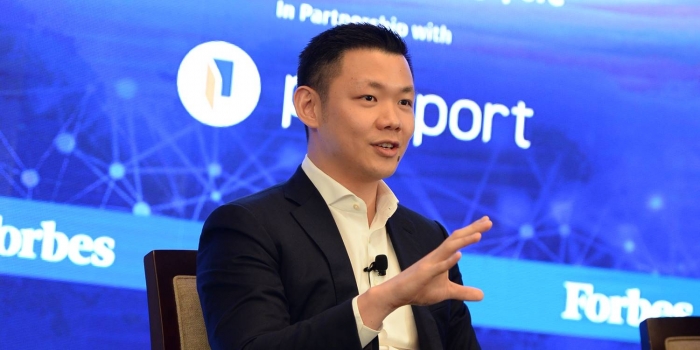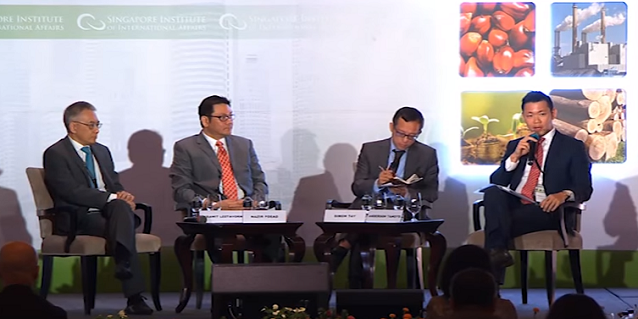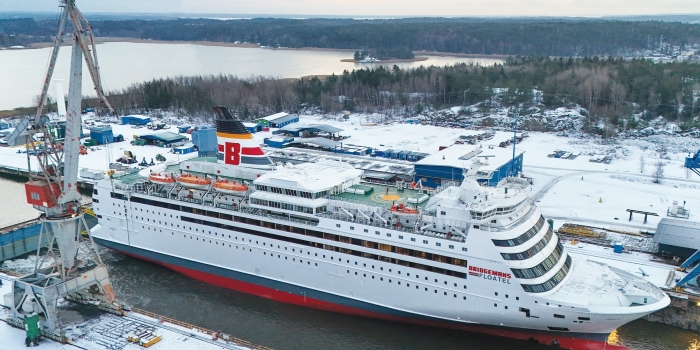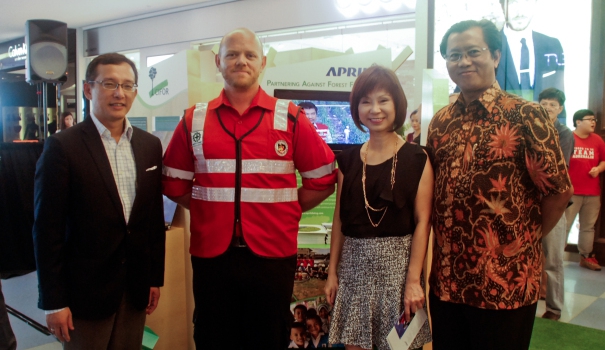RGE Director Anderson Tanoto joined entrepreneurs, investors and business leaders at the Forbes Asia Forum: Decrypting Blockchain for Business on 4 December 2018, discussing the variety of uses for blockchain. As a panelist on the “Once on the Block, Forever on the Chain” session, Tanoto touched on the uses of blockchain technology in the agri-commodity industry, and also shared his views on its possible impact in philanthropy.
The following blog post is the second and last of Tanoto’s takeaways and views on the topic:
I was honoured to have been invited as a panelist at last month’s forum on Decrypting Blockchain for Business, where I had the opportunity to share my views on blockchain implementation across the supply chain. Because of my involvement with Tanoto Foundation, the discussion briefly segued into the topic on blockchain’s application in philanthropy and impact investing. Framing blockchain through the eyes of a member of Tanoto Foundation’s Board of Trustees, I see many parallels between its application in business and in philanthropy.
Philanthropy – A Personal and Emotional Act
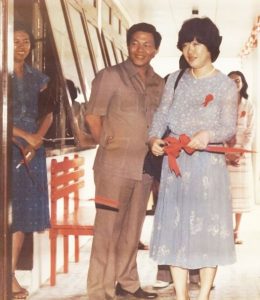
Tanoto Foundation founders Sukanto Tanoto and Tinah Bingei Tanoto open a school in Besitang in 1981. A major component of Tanoto Foundation’s work today is focused on building equitable access to quality education.
As I had shared at the Forum, philanthropy is a very personal and emotional act. My parents did not have the opportunity to complete their high school education, and naturally, a major component of Tanoto Foundation’s work today is focused on building equitable access to quality education as a means to alleviating poverty and improving lives. The emphasis on learning, growing capacities, developing potential and building resiliency remains close to my parents’ hearts.
We have seen first-hand, the on-ground challenges faced by the communities that live in and around the areas our businesses operate. We have observed that some communities do not have access to quality education for a variety of infrastructural, social and economic reasons. Tanoto Foundation has built schools, libraries, sanitation facilities, dozens of different types of infrastructure, on top of supporting numerous international, national and provincial educational development programmes, and disbursing thousands of grants and scholarships. In addition to job creation through our RGE companies, we have been particularly mindful of supporting education and life-long learning in the communities, so they may build self-sufficiency and resilience and live with dignity.
While we openly recognise that philanthropic giving is personal and emotional, we do our best to base our philanthropy on the needs of communities we serve while pursuing newer insights into measuring the effectiveness and success of our work. The launch of the United Nations Sustainable Development Goals has given us greater clarity in scoping and measuring our efforts as we align them with wider national and global aspirations while localising our methods and solutions. The growing influence of blockchain has also captured our attention, but I will get to that later.
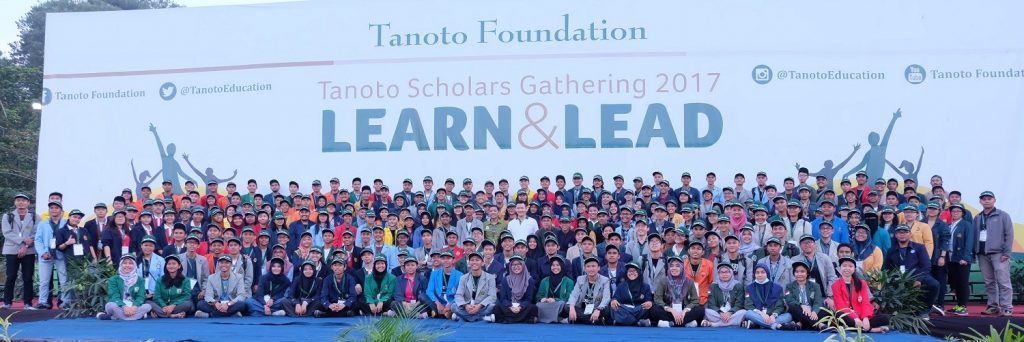
Anderson Tanoto stands with Tanoto Scholars – beneficiaries who receive scholarships and are nurtured to be leaders of the future.
Supply and Demand – Challenges
As we focus on philanthropic investing to develop lasting outcomes as desired by beneficiaries, there are a few considerations we have to take as we reconcile demand and supply in philanthropic giving. I phrase these challenges in questions.
First, how do we know for sure if the communities’ needs are clearly articulated and represented? Likewise, how can philanthropic organisations and their partners ensure solutions are properly designed and effectively implemented to meet those needs?
Second, are there more effective and objective ways to monitor, measure, verify and report on our philanthropy? After all, impact investing has to be supported with impact reporting. How much of a difference is the philanthropic dollar making?
Third, how do we scale philanthropic giving? How can we best handle the supply-demand complexity when more partners and stakeholders are involved at various stages of the impact investing process? And how do we convert scale into achieving better standards and results?
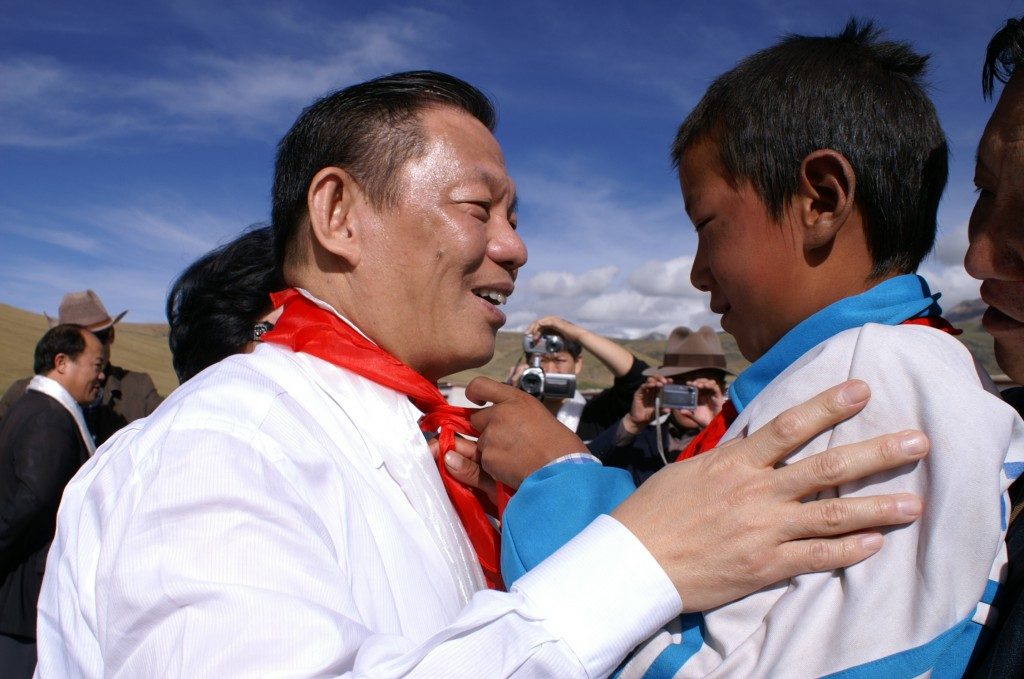
Philanthropy is a personal and emotional act. It is up to philanthropic organisations and their partners ensure solutions are properly designed and effectively implemented to meet those needs.
Blockchain’s Role: From Transactive to Collaborative
With the aforementioned challenges spelled out, this is where I believe blockchain and peer-to-peer networks can help to mutually verify, assure and validate efforts, measures and results in impact investing.
The growing awareness of blockchain as a transparent and immutable platform plays a strong role in people supporting and donating to respective charitable causes, because we trust it to have these qualities. If I may be allowed to further simplify this, blockchain addresses the “trust” in giving and the “trust” that drives giving.
The conversation on blockchain’s use for social good mostly leans toward cryptocurrency in charity and fundraising. For example, blockchain in crowdfunding allows donors to give and track the progress of their giving.
I suggest we look beyond transactions.
From the perspective of Tanoto Foundation, a self-funded philanthropy, monetary transactions may not necessarily be the most important consideration. At its crux, when we bring different stakeholders together for the purpose of achieving social good, there are processes, milestones and results that we have to articulate, monitor and measure.
Could we then leverage peer-to-peer verification to address the above three sets of challenges? The decentralised nature of blockchain supports multi-stakeholder collaboration and transactions at various phases of philanthropy. In a philanthropic project, we risk letting our personal emotions and agenda get in the way; and when many collaborators and contractors are involved, the risk of veering from the project goals may increase. There may also be inefficient use of time and resources because of ineffective implementation, and these affect beneficiaries to varying extents.
Collaboration for social good. Tanoto Foundation collaborated with multiple schools and agencies to drive the “1 Gold 1 Library” activation campaign during the 2018 Asian Games – the first of its kind. As pledged, a total of 31 school libraries will be renovated for the same number of golds won by Team Indonesia.
New Dynamics of Collaboration and Trust
This brings me back to the “trust” component in my earlier post. Being a platform that helps us reimagine the dynamics of collaboration, blockchain can be used to build trust between stakeholders and catalyse collaboration. As we move from “one-to-many” to “many-to-many” models of collaboration, stakeholders can be mutually empowered as they become mutually accountable. These are the new dynamics of collaboration and trust.
We also have to move beyond the preoccupation with the cryptocurrency aspects of blockchain, and pay closer attention to the extents to which trust can be fostered. Philanthropy and impacting investing are beyond just monetary; we cannot further overstate the criticalness of bringing and keeping people together so they can work on helping others.
What captures my attention in blockchain’s application in philanthropy is that it has the potential to not only enhance existing processes, but also provide us with new frameworks and insights into further strengthening trust, supporting mutually accountable collaboration at scale and delivering lasting tangible results for social good.
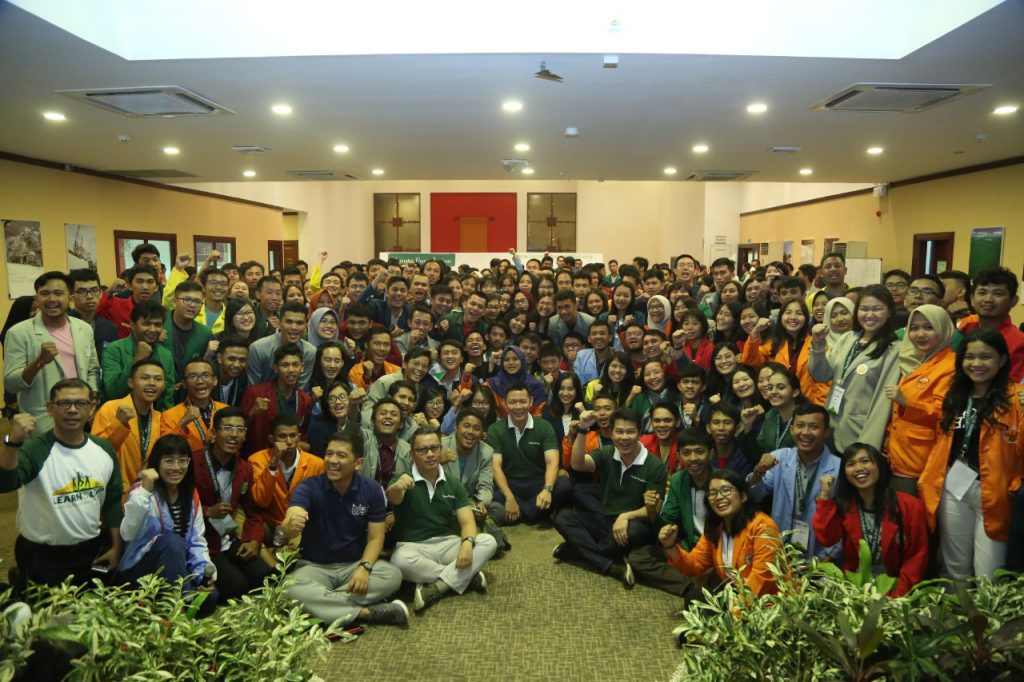
Tanoto Foundation Board of Trustees Member and RGE Director Anderson Tanoto spends some time with Tanoto Scholars at the Tanoto Scholars Gathering 2018.



